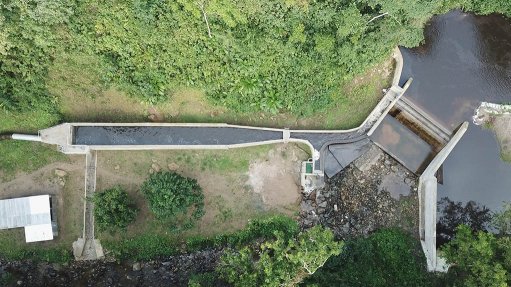
The 5.25 MW Sindila hydropower project, in Uganda.
South African private equity firm teams up with IPP to develop 14.7 MW hydro plant in Kenya
South African private equity fund manager Metier has signed an agreement with Tembo Power, of Mauritius, for the joint development of the 14.7 MW Kaptis project, a run-of-river hydropower project near the town of Kakamega, in western Kenya.
Tembo Power founder Raphael Khalifa tells Engineering News that the project will involve an investment of $44-million and will be funded through a combination of debt (70%) and equity (30%).
The project will form part of the Metier Sustainable Capital International Fund II, which recently achieved a first close of $113-million.
Metier has committed to provide financial support prior to the financial closing of the project as well as to subscribe to a 40% stake in the project.
The balance of the equity will be held by Tembo Power (40%) and WK Power (20%). WK Power is the investment arm of WK Construction, which is the preferred engineering, procurement and construction partner for the Kaptis project.
Last year, Metier and WK Construction collaborated on the building and commissioning of the 5.25 MW Sindila hydropower project, in Uganda.
Metier Sustainable Capital International Fund II principal Michael Goldblatt is optimistic about the prospect of reaching financial close on the Kaptis project during 2020 and for plant commissioning by the third quarter of 2022.
Goldblatt is equally enthusiastic about Tembo Power’s broader hydropower portfolio, “which fits in well with the fund’s strategic focus on small- to medium-scale renewable-energy projects across the continent”.
Besides Kaptis, Tembo Power is developing a portfolio of nine projects across Kenya, Burundi and the Democratic Republic of Congo with a combined capacity of 186 MW and an estimated combined construction cost of $524-million.
Khalifa, who worked as an investment banker for ten years prior to founding Tembo Power, says the agreement with Metier allows for the appointment of lenders and to advance Kaptis further towards financial close.
Besides raising finance, Tembo Power is also in talks with the Kenya Power and Lighting Company to conclude a 20-year power purchase agreement based on a tariff of $0.082c/kWh. Other conditions precedent include a letter of support from Kenya’s Treasury and the securing of a generation licence.
Once fully operational, the hydropower plant is expected to produce at a yearly rate of 86 GWh, depending on rainfall and river flow rates. Although Tembo Power is focusing on medium- to high-head sites so as to limit dependence on river flow.
The project Kaptis site was first identified by Humphrey Mulindi, who conducted preliminary investigations to assess its energy potential. Mulindi is the founder and CEO of Kenyan renewable-energy consultancy Global Sustainable Limited. The project has since been developed further by Tembo Power and WK Power.
Khalifa says that some 200 jobs will be created during construction and the plant itself will create 15 operational jobs.
While relatively small in the context of Kenya’s 2 500 MW system, the plant will help reduce imports from Uganda and displace expensive diesel power generation in western Kenya.
It is also in close proximity to existing transmission infrastructure with a new 33 kV transmission line required to connect to an existing substation and support the evacuation of power from the plant.
“Tembo Power is delighted to partner with Metier, a reputable and experienced infrastructure fund manager in sub-Saharan Africa, supported by the main development finance institutions active in the renewable energy field. Such agreement demonstrates the thoroughness of Tembo Power’s development approach, its compliance with the most stringent international standards, and paves the way for extended collaboration with Metier and other key players in the industry.” Khalifa concludes.